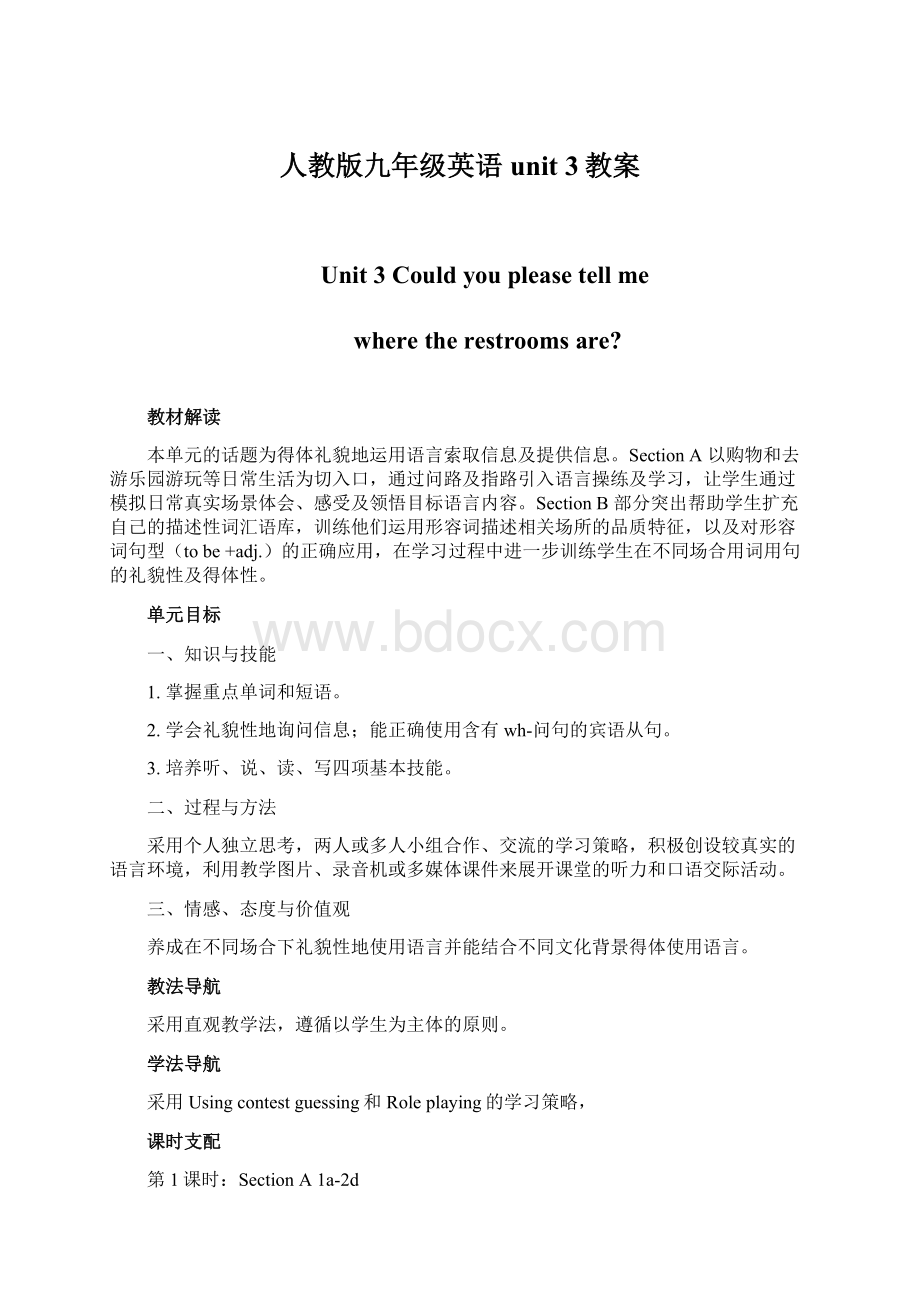人教版九年级英语unit 3教案.docx
《人教版九年级英语unit 3教案.docx》由会员分享,可在线阅读,更多相关《人教版九年级英语unit 3教案.docx(19页珍藏版)》请在冰豆网上搜索。

人教版九年级英语unit3教案
Unit3Couldyoupleasetellme
wheretherestroomsare?
教材解读
本单元的话题为得体礼貌地运用语言索取信息及提供信息。
SectionA以购物和去游乐园游玩等日常生活为切入口,通过问路及指路引入语言操练及学习,让学生通过模拟日常真实场景体会、感受及领悟目标语言内容。
SectionB部分突出帮助学生扩充自己的描述性词汇语库,训练他们运用形容词描述相关场所的品质特征,以及对形容词句型(tobe+adj.)的正确应用,在学习过程中进一步训练学生在不同场合用词用句的礼貌性及得体性。
单元目标
一、知识与技能
1.掌握重点单词和短语。
2.学会礼貌性地询问信息;能正确使用含有wh-问句的宾语从句。
3.培养听、说、读、写四项基本技能。
二、过程与方法
采用个人独立思考,两人或多人小组合作、交流的学习策略,积极创设较真实的语言环境,利用教学图片、录音机或多媒体课件来展开课堂的听力和口语交际活动。
三、情感、态度与价值观
养成在不同场合下礼貌性地使用语言并能结合不同文化背景得体使用语言。
教法导航
采用直观教学法,遵循以学生为主体的原则。
学法导航
采用Usingcontestguessing和Roleplaying的学习策略,
课时支配
第1课时:
SectionA1a-2d
第2课时:
SectionA3a-4c
第3课时:
SectionB1a-2d
第4课时:
SectionB3a-SelfCheck
课时教案
第1课时SectionA1a-2d
教学目标
一、知识与技能
1.掌握重点词汇和短语:
restroom,stamp,bookstore,beside,postcard,pardon,bathroom,rush
2.理解并掌握重点句型:
Excuseme,couldyoutellmewhereIcan…?
Excuseme,doyouknowwhereIcan…?
3.能听懂有关问路的对话。
二、过程与方法
采用情境教学法,调动学生的积极性,引导他们积极参与课堂。
三、情感、态度与价值观
学会语言使用的礼貌性和得体性。
教学重点
礼貌地运用句型:
Excuseme,couldyoutellmewhereIcan…?
Excuseme,doyouknowwhereIcan…?
能听懂有关问路的对话。
教学难点
能抓住录音中的关键词。
教法导航
课上引导学生积极参与课堂活动,老师少讲,鼓励学生多练。
学法导航
加强小组合作学习,积极回答问题。
教学准备
图片,录音机,多媒体。
教学过程
Step1Greetings
Greetthestudentsasusual.
Step2Presentation
1.Guessinggame
Showpicturestothewholeclass,onestudentexplainstheplacesinEnglishandanotheronewhodoesn’tlookattheblackboardguesseswhatplaceitis.Forexample,onestudentsays:
Wecansavemoneyorexchangemoneyinthisplace,anotheroneguessesitisabank.Getstudentstoguesstheplaceslikebank,postoffice,bookstore,museum,bathroom,washroom,mallandsoon.
2.Showsomestampstostudentsandpresentthenewsentences:
CouldyoutellmewhereIcanbuysomestamps?
CouldyoupleasetellmewhereIcangetadictionary?
DoyouknowwhereIcangetsomemagazines?
Step3Practice
Matcheachthingwithaplaceinthepicturein1a.
Readthephrases.
___getsomemoney___getsomemagazines
___havedinner___getadictionary
___getsomeinformationaboutthetown
___buyanewspaper___buysomestamps
___getapairofshoes
Step4Listening
Listenandcompletetheconversationsinthepicturein1a.Thenchecktheanswerswiththewholeclass.
Step5Practice
Makeconversationsusingtheinformationin1a.Thentalkaboutyourowncity.Forexample:
A:
Excuseme,couldyoupleasetellmehowtogettothebookstore?
B:
Sure,justgoalongMainStreetuntilyoupassCenterStreet.Thebookstoreisonyourright,besidethebank.
A:
Thanks.Doyouknowwhenthebookstoreclosestoday?
B:
Itclosesat7:
00p.m.today.
A:
Thankyou!
B:
You’rewelcome.
Step6Listening
1.Listenandnumberthedirectionsintheorderthatyouhearthem.
2aYouwillhearsomeofthedirectionsbelow.Numberthedirectionsintheorderyouhearthem.
2.Listenagain.Showhowtheboywalkstothesupermarket.Drawalineinthepicturein2a.Thengetonestudenttodrawthelineontheblackboard.
3.Listenforthethirdtimeandanswerthequestions.
1)Excuseme,canyoutellmewhereIcanbuysomemedicine?
2)Doyouknowhowtogothere?
3)OK,great.Oh,andonemorething.Doyouknowwhenthisshoppingcenterclosestonight?
Step7Pairwork
Makeconversationsabouttheotherplacesinthepicturein2a.
A:
Excuseme.CanyoutellmewhereIcanbuysomestamps?
B:
Yes,there’sapostofficeinthisshoppingcenter.
A:
Doyouknowhowtogothere?
B:
Yes.Gotothethirdfloorandturnright.Thengopastthebank.Thepostofficeisbetweenthemuseumandthelibrary.Youshouldbeabletogetstamps.
A:
OK,great.Oh,andonemorething.Doyouknow…
B:
I’mnotsure,butyou…
A:
OK,thanksalot.
B:
You’rewelcome.
Step8Reading
1.Readtheconversationin2dandanswerthequestions.
2.Role–playtheconversation.
3.Explainthelanguagepointsin2d.
(1)Pardon?
Restroom?
Youalreadywanttorest?
Butwehaven’tevenstartedyet!
1)pardon用作动词,后面既可以跟宾语,也可以跟双宾语;pardonsb.fordoingsth.意为“原谅/宽恕某人做某事”。
e.g.Canyoupardonmefornotpassingtheexam,Mom?
2)在没有听懂对方的话,请对方重复一下时也可说pardon。
e.g.Pardon?
I’msorryIcan’tfollowyou.
(2)I’mexcitedtotrytherides!
excited和exciting的区别:
1)excited意为“激动的;兴奋的”,作表语时,主语通常是人;作定语时,常用来修饰人,说明激动的表情。
e.g.Allofuswereexcitedwhenweheardthegoodnews.
Theexcitedchildopenedhispresentquickly.
2)exciting意为“激动人心的”,作表语时,主语通常是物;作定语时,常用来修饰物。
e.g.Themovieisveryexciting.
Myfathertoldmeanexcitingstory.
(3)Imean…youknow,awashroomorbathroom.
mean作动词有以下含义:
1)有……的意思,指(多作及物动词),其后可跟名词或代词,也可跟从句。
e.g.Whatdoesthiswordmean?
2)意味(着)(及物动词),常跟名词,有时可跟动词-ing形式或从句。
e.g.Carlreallycouldnotdothat---itwouldmeantheendofhiscareer.
3)有……意图,打算,想,常跟名词、代词或动词不定式。
跟带不定式的复合结构时,还可用于被动语态。
e.g.Inevermeanttohurtyou.
(4)Ninethirty,soyoudon’tneedtorush!
rushv.仓促; 匆忙 n.仓促; 匆忙
e.g.Thenthreepolicemenrushedathim.(rushv.)
Theymadearushforthedoor.(rushn.)
Step10Summary
师生共同总结问路句型。
1.Excuseme.WhereisQiaotouMiddleSchool?
2.Excuseme.CouldyoutellmewhereQiaotouMiddleSchoolis?
3.Excuseme.DoyouknowhowIcangettoQiaotouMiddleSchool?
=DoyouknowhowtogettoQiaotouMiddleSchool?
4.Excuseme.WhichisthewaytoQiaotouMiddleSchool?
课堂作业
Makeconversationsaboutyourowntown/city.
第2课时SectionA3a-4c
教学目标
一、知识与技能
1.复习、巩固宾语从句的用法并掌握委婉问路指路的句型。
2.培养阅读理解能力。
3.完成相关练习。
二、过程与方法
将抽象知识具体化,帮助学生总结规律,系统地学习语法。
调动学生的积极性,引导他们积极参与课堂。
三、情感、态度与价值观
学会礼貌地问路指路。
教学重点
复习、巩固宾语从句的用法并掌握委婉问路指路的句型。
培养阅读理解能力。
教学难点
培养阅读理解能力。
教法导航
通过大量练习让学生主动掌握语法知识。
学法导航
练习、讨论、主动探求规律。
教学准备
多媒体。
教学过程
Step1Greetings
Greetthestudentsasusual.
Step2Revision
1.TranslatethesentencesintoEnglish.
1)请你告诉我怎样去书店好吗?
2)打扰了,你知道我在哪能买到一些邮票吗?
3)我想知道公园今天什么时候关门。
4)银行和超市之间有一个餐馆。
2.Role-playtheconversationin2d.
Step3Presentation
1.Showapictureoffunpark.Askstudents:
Areyouexcitedtotrytheseinthefunpark?
2.Showaridetothemandsay:
Howdoyouthinkoftheride?
Isitfunorscary?
Doyouwanttohaveatry?
Step4Reading
1.Readtheconversationin3aquicklyanddotrueorfalse.
1)AliceandHeWeiareinWaterWorld.
2)Thenewridelooksscary.
3)Alicewasscaryatfirst.
4)Alicethinksthenewrideisactuallyfun.
5)HeWeithinksFunTimesParkrestaurantseversdeliciousfood.
6)ArockbandplaysinWaterWorldRestauranteveryevening.
7)AliceandHeWeicangolatertotherestaurant.
2.Readtheconversationagainandanswerthequestionsin3a.
1)WhydidAlicenotwanttogoonthenewride?
Howdidshefeelaftertheride?
2)WhatisspecialaboutUncleBob’srestaurant?
3)ShouldAliceandHeWeigetthereearlyfordinner?
Why?
Step5Practice
Underlinethequestionsorstatementsintheconversationthataskforinformation.Rewritetheminadifferentway.
e.g.Iwonderwhereweshouldgonext.
Couldyoutellmewherewecouldgonext?
Checktheanswerswiththewholeclass.
Step6Languagepoints
Findthedifficultpointswiththestudentsandthencheckit.
1.Iwasscaredatfirst,butshoutingdidhelp.
此句相当于Iwasscaredatfirst,butshoutingreallyhelped.原句是一种表现强调的句式,英语中,可用助动词do对谓语动词进行强调,构成强调句。
e.g.Pleasedobecareful.请一定小心。
Idoagreewithyou.我完全同意你的意见。
Hedidwarnyouotherday,remember?
他前两天就告诫过你,还记得吗?
2.IsuggestWaterCityRestaurantinWaterWorld.
suggest作动词,可意为“显示;间接表明”,后可接宾语从句。
e.g.Hisbehaviorsuggested(that)hewasakindman. 他的行为显示他是个好人。
suggest作“建议”讲时,应注意以下两点:
1)suggestdoingsth.建议做某事。
e.g.Isuggestedgoinghome.我建议回家。
2)suggest后接从句时,从句常用虚拟语气,谓语由“should+动词原形”构成,should可以省略。
e.g.Isuggestedthatwe(should)gohome.我建议我们回家。
另外,suggestion是suggest的名词形式,作“建议”讲时,是可数名词。
e.g.Doyouhaveanysuggestions?
你有什么建议吗?
3.Therestaurantisalwaysbusy,atthattimesocomealittleearliertogetatable.
用于“就餐”的语境时,形容词busy相当于“吃饭人多;餐厅拥挤”的意思;动词短语togetatable类似于汉语“定餐桌;占位子”等意思。
Thengivethestudentsafewminutestolearnthepointsbyheart.
Step7GrammarFocus
Letstudentscompletethesentences.
1.打扰了,你知道我能在哪买到一些药?
Excuseme,doyouknowwhere_________buysomemedicine?
2.当然,顺着这条街有个超市。
Sure.Thereisasupermarket.
3.请你告诉我怎样到邮局好吗?
Couldyoupleasetellme_________gettothepostoffice?
4.对不起,我不确定怎样到那。
______,Iam____________howtogetthere.
5.你能告诉我们今晚乐队什么时候开始演奏吗?
Canyoutellus______________________playingthisevening?
6.晚上8点开始。
Itstartsat.
7.我想知道接下来我们该去哪儿。
I______wherewe________________.
教师巡回指导,查看。
然后师生共同核对答案。
教师让学生找出含有的宾语从句,师生共同学习Objectiveclauseswithwh-questions.
上一个单元我们已经学习了由that和whether,if引导的宾语从句。
这个单元我们继续学习由疑问词引导的宾语从句。
疑问词:
疑问代词(what、whom、who、whose、which)疑问副词(when、where、why、how)。
语序:
无论主句是陈述句还是疑问句,也无论主从句间是什么引导词,宾语从句一律用陈述语序,即“引导词+主语+谓语+其它”。
如:
CouldyoutellmewhereWeiFanglives?
时态:
1)如果主句是一般现在时或一般将来时,宾语从句的时态不受限制,可根据实际表达的需要来确定。
如:
Jennyknowsthemanwasflyingakiteatthattime.珍妮知道当时那人正在放风筝。
YouwillunderstandwhyIdiditoneday.总有一天你会明白我为什么那样做。
2)如果主句是一般过去时,宾语从句用过去时态的某种形式。
如:
Ithoughthehadgonetotownthatday.我以为他那天进城去了。
3)如果宾语从句叙述的是客观事实、自然现象或科学真理等,从句不受主句时态的限制,用一般现在时。
如:
Hesaidtimeismoney.他说时间就是金钱。
Step8Practice
1.Rewritethequestionsin4atomakethemmorepolite.
1)WherecanIbuysomegrapesorotherfruit?
2)HowdoesthisCDplayerwork?
3)HowdoIgettotheCentralLibrary?
4)IstheItalianrestaurantnearbyopenonMondays?
Getstudentswritedowntheiranswersintheirbooks.
2.Whatshouldeachpersonaskinthefollowingsituations?
Letstudentswritedowntheiranswersandthensaytheiranswersonebyone.
1)Timisveryhungry.Hewonderswheretogetsomethingtoeat?
Excuseme,wouldyoumindtellingmehowIcangettoanearbyrestaurant?
Pardonme,doyouknowifthere’sarestaurantaroundh